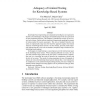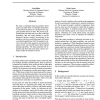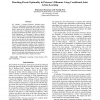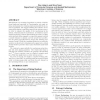205 search results - page 2 / 41 » When Can Limited Randomness Be Used in Repeated Games |
IJAIT
2000
13 years 5 months ago
2000
Knowledge-based engineering and computational intelligence are expected to become core technologies in the design and manufacturing for the next generation of space exploration mi...
UAI
2008
13 years 6 months ago
2008
We study a multiagent learning problem where agents can either learn via repeated interactions, or can follow the advice of a mediator who suggests possible actions to take. We pr...
AAMAS
2007
Springer
13 years 5 months ago
2007
Springer
We consider a repeated Prisoner’s Dilemma game where two independent learning agents play against each other. We assume that the players can observe each others’ action but ar...
SOUPS
2009
ACM
13 years 11 months ago
2009
ACM
Randomness is a necessary ingredient in various computational tasks and especially in Cryptography, yet many existing mechanisms for obtaining randomness suffer from numerous pro...
CORR
2010
Springer
13 years 4 months ago
2010
Springer
Calibrated strategies can be obtained by performing strategies that have no internal regret in some auxiliary game. Such strategies can be constructed explicitly with the use of B...




